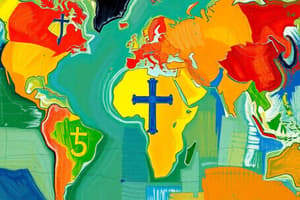Podcast
Questions and Answers
Which religion was founded in Iraq in the mid-19th century by Mīrzā Ḥosayn ʿAlī Nūrī?
Which religion was founded in Iraq in the mid-19th century by Mīrzā Ḥosayn ʿAlī Nūrī?
- Confucianism
- Judaism
- Jainism
- Bahaism (correct)
Which religion is characterized by a belief in one transcendent God who revealed himself to Abraham, Moses, and the Hebrew prophets?
Which religion is characterized by a belief in one transcendent God who revealed himself to Abraham, Moses, and the Hebrew prophets?
- Bahaism
- Judaism (correct)
- Confucianism
- Jainism
Which religion is associated with the teachings of Confucius in ancient China?
Which religion is associated with the teachings of Confucius in ancient China?
- Confucianism (correct)
- Judaism
- Bahaism
- Shintoism
Which religion teaches a path to spiritual purity and enlightenment through disciplined nonviolence?
Which religion teaches a path to spiritual purity and enlightenment through disciplined nonviolence?
Which religion is closely tied to traditional Japanese religious practices and social life?
Which religion is closely tied to traditional Japanese religious practices and social life?
What is the common thread between all these religious organizations?
What is the common thread between all these religious organizations?
What does extrinsic religiosity refer to?
What does extrinsic religiosity refer to?
Which of the following religions originated in the Punjab region of the Indian subcontinent?
Which of the following religions originated in the Punjab region of the Indian subcontinent?
What is the literal meaning of the Arabic term 'islām'?
What is the literal meaning of the Arabic term 'islām'?
Which religion developed from the teachings of the Buddha?
Which religion developed from the teachings of the Buddha?
What is the name of the founder of Christianity?
What is the name of the founder of Christianity?
Which of the following religions is monotheistic?
Which of the following religions is monotheistic?
What is the primary purpose of Satan according to the text?
What is the primary purpose of Satan according to the text?
What is guaranteed by the Philippine Constitution regarding religion?
What is guaranteed by the Philippine Constitution regarding religion?
What type of corporation is exempt from tax in the Philippines?
What type of corporation is exempt from tax in the Philippines?
What is allowed in public schools in the Philippines?
What is allowed in public schools in the Philippines?
What is included in the freedom of religion?
What is included in the freedom of religion?
What is the status of all denominations in the Philippines?
What is the status of all denominations in the Philippines?
Flashcards are hidden until you start studying
Study Notes
Religions of the World
- Judaism: characterized by belief in one transcendent God, revealed to Abraham, Moses, and Hebrew prophets, with religious life in accordance with Scriptures and rabbinic traditions.
- Bahaism: founded in Iraq in the mid-19th century by Mīrzā Ḥosayn ʿAlī Nūrī, known as Bahāʾ Allāh, meaning “Glory of God” in Arabic.
- Confucianism: the way of life propagated by Confucius in the 6th–5th century BC, followed by Chinese people for over two millennia, remaining the substance of learning, values, and social code.
- Jainism: Indian religion teaching spiritual purity and enlightenment through disciplined nonviolence (ahimsa) to all living creatures.
- Shintoism: traditional Japanese religious practices, beliefs, and attitudes, observed in social life and personal motivations of Japanese people.
Top Ten Religions in the World
- Christianity: major religion stemming from the life, teachings, and death of Jesus of Nazareth in the 1st century CE.
- Islam: major world religion promulgated by the Prophet Muhammad in Arabia in the 7th century CE, based on surrender to the will of Allah (God).
- Hinduism: major world religion originating on the Indian subcontinent, comprising varied systems of philosophy, belief, and ritual.
- Buddhism: religion and philosophy developed from the teachings of the Buddha, a teacher who lived in northern India between the mid-6th and mid-4th centuries BCE.
- Sikhism: religion originating in the Punjab region of the Indian subcontinent, present-day Pakistan, around the end of the 15th century CE.
- Judaism: monotheistic religion developed among ancient Hebrews.
Ethics and Religion
- The relationship between religion and ethics is about the connection between revelation and reason.
- Extrinsic religiosity: treating religion as a means to obtain extrinsic goals rather than valuing it for its own sake.
Freedom of Religion in the Philippines
- The Philippine Constitution (Article III, Section 5) guarantees freedom of religion, prohibiting laws that establish or prohibit the free exercise of religion.
- The National Internal Revenue Code (Section 30E) exempts non-stock corporations organized for religious, charitable, scientific, athletic, or cultural purposes from taxation.
- The government allows the teaching of religion in all public schools, with classrooms and classes held within the class hour of the day, like an academic subject.
- Religious freedom includes freedom to believe, freedom to practice, and equal observance for all denominations, indigenous, foreign founded, or locally originated.
Studying That Suits You
Use AI to generate personalized quizzes and flashcards to suit your learning preferences.


